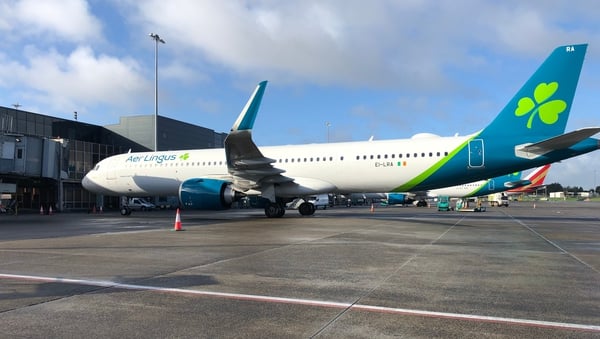Minister for Finance, Public Expenditure and Reform Paschal Donohoe has warned that granting the nursing unions' demand for a pay rise would trigger knock-on claims among other public service grades.
Speaking in the Dáil, Mr Donohoe also claimed the scale and timing of the planned nurses' strikes was designed to maximise the impact it will have on patients.
The minister said he was very much aware of the contribution of nurses, but said he was equally aware of the contributions other public servants make to the economy and society.
He said if the nurses' demands were granted, the empty chairs in the Dáil would quickly be filled with other public servants asking why the same money could not be made available for them.
He said the challenge of meeting such knock-on claims would be too great and could spell massive difficulty for the ability of the Public Service Stability Agreement (PSSA) to stay in place.
He also cautioned that if a commission were set up to examine pay and conditions for nurses, other groups could seek similar commissions.
Mr Donohoe defended the PSSA, which he said would deliver €1.1 billion in additional wage increases for Government employees.
He said the Government will do all that can be done to resolve the issue within the agreement through the PSSA Oversight Group, and through bilateral contacts between the parties.
Earlier, opposition politicians called for an independent review to examine the pay and duties of nurses and midwives to be completed within six weeks.
The call came as 43,000 nurses belonging to the Irish Nurses and Midwives Organisation and the Psychiatric Nurses Association prepared to hold strikes from 30 January in a dispute over pay and staff shortages.
The Dáil earlier debated a Private Members motion from Fianna Fáil health spokesperson Stephen Donnelly calling on the Government to engage with nursing unions, and to establish a judge-led commission to examine issues in the nursing sector.
Mr Donnelly's motion wants any independent review to take account of the introduction of the nursing degree programme, the extra specialties and extended duties that have evolved and that can be further enhanced, as well as examining the remuneration, contracts, and allowances with a view to addressing the chronic recruitment and retention challenges in the health service.
However, Labour, Sinn Féin, the Social Democrats and Independents4Change say the Fianna Fáil motion does not go far enough, because it does not set an exact timeframe for the review, and does not specifically address the issue of pay.
They have tabled an amendment to the Fianna Fáil motion, setting a six-week deadline for completion of a review to be headed up by a judge or a healthcare expert.
Their amendment also calls on the Government to acknowledge that pay will form part of any resolution to the current dispute, and to agree an implementation road map with unions on how nurses can achieve pay parity with comparable grades in the health service.
Speaking ahead of this afternoon's debate, Sinn Féin health spokesperson Louise O'Reilly said it was ludicrous to suggest that the nurses' dispute could be resolved without touching on the issue of pay.
She insisted that the nurses' pay issues could be resolved without breaching the public service pay agreement.
Read more:
Bid to avert nurses' strikes, hospital cancellations
Govt says proposals for pay parity for nurses not on the table
Varadkar pledges to avoid strike by nurses
Labour health spokesperson Alan Kelly said there was no denying that pay was a factor in the recruitment and retention crisis in nursing.
He noted the Public Service Pay Commission report had acknowledged the grievances of nurses, and said arrangements could be put in place to look at pay.
He said the review should lay out the scale of extra work and duties for nurses, and how they could be compensated for that.
He said opposition parties had come together to show solutions were possible without dismantling the public service pay agreement.
The Fianna Fáil motion also notes that the number of nurses has fallen by 1,754 between 2008 and 2018, while there was a 40% increase in psychiatric nursing vacancies between November 2017 and September of last year.
This is at a time when demand for health services has risen significantly.
It also cites the fact that the Health Service Executive spending at least €1.4m on agency nurses each week, while there is only one applicant for every four nursing and midwifery vacancies.
Meanwhile, Solidarity/People Before Profit submitted a separate amendment to the Fianna Fáil motion, calling on the Government to allocate additional funding this year to ensure that the crisis in recruitment and retention is addressed.
It also urges the Government to move immediately to achieve parity for nursing staff with other graduate health care professionals.
The Solidarity/People Before Profit motion also demands that all staff in the health service should be directly employed, with outsourcing of employment ended.
It also seeks a fully funded national health service free at the point of use.
Solidarity/People Before Profit TD Bríd Smith said the nurses' dispute was not just a pay dispute, but was about the kind of health service the country wanted in the future.
Nursing unions are to meet the HSE and the Department of Health on Monday for further talks.
In the meantime, the INMO said that it was "regrettably" continuing its preparations for the strikes, with strike committees now formed in individual hospitals.
It remains unclear when the HSE will start cancelling operations, procedures or outpatient appointments, and what contingency arrangements will be in place if the strikes proceed.






